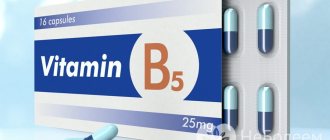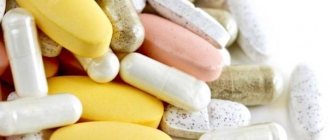Methionine is an organic compound related to amino acids, which in turn are part of proteins. This crystalline, water-soluble substance with an unpleasant taste and odor was isolated from casein in 1922.
Methionine is a sulfur-containing amino acid that is essential for humans, that is, it performs a number of useful functions in the body and must be supplied with food. On the other hand, if consumed in excess, methionine can cause harm.
In Russia, the most common form of methionine is in the form of tablets in a pink film shell containing 250 mg of amino acid. In pharmacies the product is sold at a price of 50 to 100 rubles. per pack 50 pcs. A doctor's prescription is required for purchase.
Compound
There is only one active substance in Methionine tablets – the amino acid itself. In addition, the drug contains a number of auxiliary components that make it possible to provide the drug with the required form without having any noticeable effect on the body.
Thus, the tablet core contains as fillers: starch, microcrystalline and methylcellulose, stearic acid, magnesium stearate. To form the film coating of the tablets, the following were used: hypromellose, polysorbate-80, titanium dioxide, dye and talc.
Methionine, whose benefits and harms for humans are still controversial in the scientific community, as the main component of the drug of the same name, affects the body in the following areas:
- metabolic – actively participates in many important chemical reactions of metabolism;
- detoxifying – binds and removes harmful compounds;
- hepatoprotective – supports normal liver function.
The active participation of methionine in metabolism is explained by the composition of its branched formula. All amino acids consist of hydrogen, carbon, oxygen and nitrogen, but the methionine molecule also contains sulfur.
None of the essential amino acids contain this element anymore. In addition, the methionine formula contains an important mobile and reactive fragment - a methyl group, which is a combination of one carbon atom with three - hydrogen (CH3).
In order for the cleavage of methyl groups to begin and their transfer to other organic substances (transmethylation process), methionine is first activated in the body under the action of a certain enzyme.
The synthesis of its effective form, S-adenosylmethionine (SAM), is the result of combining methionine and adenosine molecules. It is SAM that enters into many biochemical reactions and is the main supplier of methyl groups.
Methylation processes occur very intensively and play an important role in the body. As a result of these reactions, substances such as carnitine, lecithin, creatine, adrenaline, taurine, choline and others are synthesized, intermediate toxic metabolic products (metabolites), foreign compounds and drugs are neutralized.
After the methyl group is removed from S-adenosylmethionine and adenosine is subsequently released, the non-protein amino acid homocysteine is formed. Interestingly, in the presence of a sufficient amount of folic acid and vitamins B6 and B12, either reverse regeneration (demethylation) of homocysteine into methionine or the synthesis of another amino acid, cysteine, can occur.
In the case of a deficiency of these vitamins, a third, undesirable option occurs, in which excess homocysteine in the blood has a damaging effect on blood vessels.
There are L- and D-isomers of the amino acid methionine, the formulas of which are essentially mirror images of each other. However, L-methionine is more compatible with the body, which is why this type of amino acid is used in medications.
Indications for the use of methionine, dosage
Researchers have established recommended daily intakes for sulfur-containing amino acids (methionine and cysteine), but studies have also examined the side effects of higher doses.
Recommended dosage
The recommended daily intake of methionine and cysteine is 19 mg/kg per day for adults, which is about 1.3 grams for a person who weighs 68 kg (68 kg).
However, some researchers recommended consuming twice as much (). Older adults often have low methionine intake, and studies have shown that they may need a higher intake of 2-3 grams per day ().
Although certain groups may benefit from increasing their methionine intake, many diets exceed 2 grams per day of methionine plus cysteine.
Diets including vegan, vegetarian, traditional and high protein are estimated to contain between 2.3 and 6.8 grams per day of these amino acids ().
Examples of good quality supplements
Country Life, L-Methionine, 500 mg, 60 Tablets
Now Foods, L-Methionine, 500 mg, 100 Capsules
Indications for the use of methionine
There is some evidence that methionine may be effective for the following conditions:
- Supports liver detoxification phases.
- Artery health.
- For short intense workouts.
- Tides. Early research suggests that taking methionine may reduce hot flashes in postmenopausal women.
- Viral diseases (herpes simplex, human papillomas).
- Shingles.
- Pancreatitis (inflammation of the pancreas).
- Depression.
- Alcoholism.
- Allergies.
- Asthma.
- Radiation side effects.
- Mental illnesses (including schizophrenia).
- Quitting drugs.
- Mammary cancer. Eating more methionine may be associated with a lower risk of breast cancer.
- Colon cancer. Eating a diet rich in methionine and folate, a type of B vitamin, helps reduce the risk of colon cancer. This is especially true for people with a family history of colon cancer and people who drink large amounts of alcohol.
- Congenital neural tube defects. Women who consume more methionine during pregnancy have a lower risk of neural tube birth defects.
- Parkinson's disease. Early research shows that taking L-methionine orally for 6 months improves symptoms of Parkinson's disease, such as tremors, inability to control movement, and rigidity.
To develop an individual program for healing the body and naturopathic correction of diseases, we recommend contacting health-coaching.
Contraindications for the use of methionine
1. MTHFR hemostasis mutations . Mutations in the MTHFR gene can lead to elevated homocysteine levels. Methionine restriction is usually recommended to reduce homocysteine accumulation.
2. Cancer . Although studies have not been done in humans, there is some evidence that cancer cells grow less robustly and sometimes undergo apoptosis (cell death) when deprived of methionine.
3. Depression . High methionine intake may increase homocysteine levels and the risk of depression.
4. Insulin resistance . Methionine restriction has been shown to reduce obesity and improve insulin sensitivity. Low methionine diets increase metabolic flexibility and overall insulin sensitivity and improve lipid metabolism while reducing systemic inflammation.
Effect on homocysteine
Perhaps the biggest problem associated with high methionine intake comes from one of the molecules this amino acid can produce.
Methionine can be converted to homocysteine, an amino acid associated with several aspects of cardiovascular disease. High methionine intake can lead to an increase in homocysteine. Although this does not happen to all people to the same extent.
Interestingly, research suggests that the potential dangers of high methionine intake may be related to homocysteine rather than methionine itself (). That is, if you already have risks associated with cardiovascular diseases:
- homocysteine above 8,
- mutations of the MTHFR hemastasis genes,
then you are definitely contraindicated from taking methionine as a dietary supplement.
However, there are other factors that can change homocysteine levels. For example, despite the lower intake of methionine in the diets of vegans and vegetarians, they may have more homocysteine than meat eaters due to their low intake of vitamin B12 ().
Another study found that a high-protein, high-methionine diet did not increase homocysteine after six months compared to a low-protein, low-methionine diet (). Additionally, methionine has been shown to have no effect on homocysteine in healthy adults without vitamin deficiency ().
Thus, scientific evidence regarding the effect of methionine on homocysteine is contradictory. However, if you are not at risk, do not take methionine supplements, and eat a healthy diet, you do not need to worry.
Daily norm
There are no exact figures determining the daily intake of methionine as a food additive. Everything is individual and depends on the patient’s condition and the purposes for which the drug is prescribed: as a hepatoprotector, for protein deficiency, poisoning, intense sports.
Consequently, conclusions about the need to prescribe the drug and its dosage are made by a doctor of the appropriate profile: a hepatologist, nutritionist, neurologist or therapist.
The minimum effective daily dose of methionine is considered to be 500 mg. On average, about 1.5-2 g of this substance is recommended for an adult (in some sources - from 700 mg to 4 g). In general, taking methionine is considered safe, and it is possible to exceed the permissible doses, but not more than three times.
At the same time, there are WHO recommendations on the consumption of essential amino acids from food. According to these data, an adult needs 10.4 mg of methionine per day per 1 kg of weight. For children over 3 years old, this figure increases by 10-20%.
For bodybuilders, the methionine norm is calculated based on the fact that for every kilogram of an athlete’s weight, at least 12 mg of the amino acid is required. But during competitions, the dosage can be increased by 1.5-2 times.
When treating liver diseases, recommendations for taking the drug Methionine may be significantly higher. Thus, the instructions for it indicate that for adults the daily dose of the medicine is acceptable in the range of 1.5-6 g, and for children over 6 years old - from 0.75 to 2 g.
Methionine preparations
The pharmacy sells medications containing methionine. Usually the element is produced in the form of dietary supplements. The highest quality products include the following:
- L-Methionine Now Foods. The package contains 100 capsules. The amount of active component is 500 mg. To normalize the amino acid content, it is recommended to take 2 capsules. This should be done once a day before meals. The dietary supplement additionally contains vitamin B6. It ensures more efficient absorption of the product.
- L-Methionine Solgar. The pack contains 90 capsules. Their dosage is 500 mg. The medication contains only methionine, which is easily absorbed. You need to take the medicine daily. Doctors usually recommend 1-2 capsules. The product is consumed before meals.
Before using any methionine-based product, you should consult your doctor. Despite the obvious benefits, the substance has limitations. This category includes the following:
- viral hepatitis;
- children's age less than 6 years;
- kidney failure;
- increased sensitivity;
- liver failure;
- pregnancy and breastfeeding.
Application
Methionine (benefit and harm to humans depends on its amount coming from outside) has a fairly diverse pharmacological effect.
This allows it to be used in various conditions:
- liver damage (hepatitis, cirrhosis, fatty degeneration, various poisonings - toxic substances or drugs, alcoholism);
- protein deficiency in a vegetarian diet, dystrophy;
- atherosclerosis;
- arthritis;
- pregnant women with toxicosis and problems with the placenta;
- intense sports activities;
- mild and moderate depression:
- to improve the condition of skin, hair and nails.
Contrary to popular belief, there is no reason to believe that supplementing with methionine can significantly help in losing excess weight. During a low-protein diet, it compensates for the lack of protein; during intense training, it helps muscles recover, but it will not be possible to lose weight by taking a single amino acid alone.
When taking methionine, it is important to consume enough vitamins B6, B12, and folic acid from food or supplements.
Methionine.
Benefits and harms Take the amino acid on an empty stomach (half an hour to an hour before meals), the daily dose prescribed by the doctor is divided into 3-4 times. The duration of treatment ranges from 10 days to a month. Interval use of the drug is allowed, when after 10 days of treatment a ten-day break is taken.
The benefits and harms of methionine for humans
The main benefits of amino acids:
- Improving the functioning of the gastrointestinal tract.
- Removing excess fluid and toxins from the body.
- Improves the function of internal organs, especially the liver, reducing visceral fat levels.
- Increases metabolism and performance of the body.
- Accelerating weight gain and weight loss, increasing the overall endurance of the body.
- Stabilization of the psycho-emotional state.
- Restoring the circadian rhythm.
- Improvement of cartilage and skin tissues.
No harm to humans from methionine has been identified, although it has contraindications, side effects in case of overdose and individual intolerance.
Therefore, the drug should be prescribed and taken under medical supervision.
Beneficial features
Methionine, whose benefits and harms for humans can manifest themselves in different ways, is a donor of methyl groups and a supplier of sulfur for the production of another amino acid - cysteine, thus participating in many metabolic processes in the body.
It is with methionine that the production of any protein in the body begins, even if its final formula does not include the presence of this amino acid. If there is not enough methionine, the rate of protein reproduction drops, and in its absence, the synthesis of protein molecules is completely impossible.
In addition to this critical mission, methionine performs the following beneficial functions:
- as a lipotropic compound, it normalizes the metabolism of lipids and cholesterol in the body, improves liver function, and prevents its fatty hepatosis;
- is an antioxidant, promoting detoxification in case of poisoning with chemicals and medications;
- has a positive effect on the health of the urinary tract, increasing the acidity of urine due to the sulfur content, and thereby protecting them from infections;
- reduces the level of histamine and, accordingly, the severity of the inflammatory process in allergic diseases;
- relieves the intensity of symptoms of Parkinson's disease, such as muscle rigidity and tremors;
- reduces bone fragility by preventing calcium leaching, is a cartilage-forming substance and ensures the safety of joints;
- somewhat alleviates the symptoms of moderate depression by acting on neurotransmitters and participating in the synthesis of adrenaline;
- reduces the damaging effects of ionizing radiation;
- promotes rapid muscle recovery in athletes, the removal of ammonia after the breakdown of proteins, but does not have significant anabolic properties;
- corrects hormones by regulating estrogen production.
Another methionine-derived substance has beneficial properties, namely a pronounced antiulcer effect on the mucous membranes of the stomach and intestines.
This is methylmethionine sulfonium chloride, or vitamin U, as it is conventionally designated. Its formula differs from methionine in the presence of an additional methyl group, and the mechanism of the cytoprotective effect of this substance has not yet been fully studied.
Functions in the body
Methionine is a precursor to cysteine and taurine, and is therefore important in the synthesis of these substances. It is also known for its antioxidant properties, making it an excellent defender against free radicals and toxins. The amino acid reacts with harmful substances, protecting cells from destruction, and helps cleanse the body of toxins and heavy metals. With a deficiency of this useful substance, the body loses its ability to cleanse itself, and swelling appears caused by excess fluid in the tissues.
Content:
- Functions in the body
- Urinary tract
- Daily requirement
- Who needs dose adjustment
- Dangers of methionine deficiency
- Excess: what is dangerous?
- Methionine in food
- Interaction with other substances
Has your hair started to fall out, and your chances of developing atherosclerosis have increased sharply? Most likely, the body does not have enough methionine. Being the basis for proteins and hormones (for example, adrenaline, choline, melatonin), methionine influences many vital processes in the body. And even energy metabolism and transport of polyunsaturated fatty acids across the mitochondrial membrane also depend on this amino acid. It is a necessary element for the body's proper sleep-wake cycle. In addition to all of the above, it helps reduce the level of histamine in the blood, which allows methionine to “tame” allergic reactions.
Harmful properties
Methionine exhibits its toxic properties when present in excess in the human body, especially if there is a simultaneous deficiency of other beneficial substances, namely B vitamins: pyridoxine (B6), folic acid (B9), and B12.
Under such circumstances, high levels of homocysteine in the blood plasma (a condition called homocysteinemia) leads to damage to the structure of the walls of blood vessels, which the body tries to repair with cholesterol. This is how cholesterol plaques appear, even if there is no excess of its normal amount in the blood.
Research suggests that toxic methionine levels can be corrected with glycine, which increases its breakdown and reduces the amount of homocysteine in the blood.
Constant consumption of foods excessively rich in methionine can over time provoke atherosclerosis, obesity, diabetes mellitus, and also reduce life expectancy. Thus, there is a study according to which a diet with a reduced content of methionine prolongs life.
Corresponding experiments on laboratory animals have shown that limiting the amino acid in their diet increases life expectancy by 40%. As for people, such diets are unacceptable for a growing body, while for adults, if they are not professional athletes, they do not pose a threat.
Diets low in methionine are also used in the treatment of cancer. The fact is that most cancer cells need this amino acid, while healthy cells can survive without it.
Where is the most: leading sources in the table
S-methylmethionine is found primarily in plant foods , so vegetarians are not deficient. The table below shows the vitamin U content of plant and animal foods (by food group).
The table clearly shows that animal products containing vitamin U are useless, but not all plant products can be considered a source of methionine.
| Products | Content of s-methylmethionine, mg/100 g |
| Asparagus | 100-260 |
| White cabbage | 35-85 |
| Cauliflower, corn, beets, parsley, pea sprouts | up to 20 |
| Potatoes, carrots, pumpkin, bell peppers, spinach, bananas, green tea | up to 1 |
| Milk, liver, egg yolk | up to 0.05 |
Product table
Methionine, whose benefits and harms for humans are individual in each specific case, should ideally be supplied to the body through food. On average, the most methionine is found in high-protein foods of both animal origin (meat, fish, cheese) and plant origin (nuts and seeds).
Much less of this amino acid is found in cereals and legumes. There is practically no methionine in vegetables and fruits. For example, in 100 g of apples there is only 1 g, carrots - 18 g, oranges - 20 g, potatoes - 31 g.
The table provides approximate data on the average methionine content in different food products.
| Food | Methionine content per 100 g of product, mg | |
| Dairy | ||
| Cheese | Parmesan | 958 |
| Swiss | 784 | |
| Edam | 721 | |
| Tilsiter | 754 | |
| Gouda | 719 | |
| Mozzarella | 515 | |
| Feta | 368 | |
| Low-fat cottage cheese (1%) | 373 | |
| Eggs | ||
| Whole egg, raw | 380 | |
| Raw protein | 394 | |
| Raw yolk | 378 | |
| Whole cooked egg | 411 | |
| Dry egg powder | Whole | 1504 |
| Protein only | 3204 | |
| Yolk only | 860 | |
| Meat products (cooked) | ||
| Chicken | 833 | |
| Duck | 635 | |
| Turkey | 724 | |
| Pork | 687 | |
| Beef | 562 | |
| Mutton | 726 | |
| Fish (cooked) and seafood | ||
| Carp | 677 | |
| Granular caviar (red and black) | 646 | |
| Cod | 676 | |
| Sea bass | 735 | |
| Herring | 682 | |
| Mackerel | 706 | |
| Pollock | 696 | |
| Nuts and seeds (dried) | ||
| Hazelnut (hazel) | 222 | |
| Pine nuts | 259 | |
| Sunflower seeds | 494 | |
| Brazilian nut | 1124 | |
| Sesame | 586 | |
| Pistachios | 344 | |
| Almond | 157 | |
| Cereals (cooked), flour | ||
| Rice | wild | 114 |
| brown long grain | 58 | |
| white long grain | 71 | |
| white sticky | 47 | |
| Millet | 70 | |
| Bulgur | 48 | |
| Buckwheat | 44 | |
| Rye flour | 194 | |
| Wheat flour | 228 | |
| Corn flour | 145 | |
| Pasta | 65 | |
| Legumes | ||
| Soy protein isolate | 1130 | |
| Dried peanuts | 291 | |
| Boiled soybeans | 224 | |
| Boiled black beans | 133 | |
| Boiled beans of all types | 113 | |
| Boiled chickpeas | 116 | |
| Boiled peas | 85 | |
| Boiled lentils | 77 | |
Methionine in food
The element is not produced by the body, so it is necessary to consume foods containing methionine. You need to eat protein foods that contain increased amounts of amino acids.
The element is considered water-soluble, therefore it is not recommended to soak products containing it in water for a long time. Also, sources of methionine should not be cooked for a long time. Exposure to elevated temperatures leads to the destruction of valuable amino acids.
To provide the body with methionine, you need to eat the following foods:
- Parmesan;
- pork;
- tuna;
- chicken;
- turkey;
- beef;
- fresh salmon;
- beans;
- yogurt;
- eggs;
- sesame.
A healthy diet should include green vegetables. Brussels sprouts and nuts are considered valuable sources of amino acids. The component is present in cheese, spinach, pork, and soy. People looking to gain muscle should get their amino acids from animal products.
A sufficient amount of the element is present in pumpkin and sunflower seeds. It is found in foods such as sesame, cashews and pistachios. 100 grams of these products includes 13-30% of the daily volume.
People whose diet contains a lot of meat do not have to worry about the lack of a medicinal product. 100 g of meat products contains an amount of methionine that exceeds the daily amount.
Quite a lot of the element is present in cheeses. In addition to parmesan, a lot of methionine contains: low-fat cottage cheese, mozzarella, goat cheese. To increase the level of the element in the blood, you should eat mackerel, mullet, and salmon. The substance is present in mussels, crabs, and crayfish.
Possible complications
An overdose of methionine (more than 6 g per day) can cause unpleasant symptoms: tachycardia and decreased blood pressure, drowsiness, dizziness, impaired coordination of movement and confusion, even disorientation in space. Allergy, nausea and vomiting are also possible as side effects. Large doses of methionine can aggravate the course of schizophrenia.
Signs of methionine deficiency:
- various liver lesions, obesity;
- swelling, brittleness and dryness of nails and hair;
- malformations of the nervous system in newborns;
- slower growth and development of children;
- muscle weakness;
- nervous system disorders, mental imbalance (anger, irritability).
It is not recommended to use drugs with methionine for cancer, viral hepatitis, severe liver and kidney failure.
Who needs dose adjustment
There are conditions when the body not only needs to receive the usual daily dose of methionine, but due to some physiological processes it requires a little more. Typically, an increase in the dose of amino acid is necessary after poisoning with “chemicals” or alcohol, after illnesses that have weakened the immune system. Multiple sclerosis, diabetes, Parkinson's disease, Alzheimer's disease, mastopathy, some disorders of the liver or gallbladder, arthritis, obesity - considerable reserves of methionine will also be needed to combat these ailments.
You should not neglect foods rich in amino acids during pregnancy, since the formation of the nervous system of the unborn child directly depends on this substance. Hepatitis A, high cholesterol, some cardiac diseases and chronic liver failure, on the contrary, are a serious signal that methionine should not be abused.
Analogs
If we consider Methionine, first of all, as a hepatoprotective agent, that is, a drug that has a positive effect on the liver, then its analogues in action are drugs of the same group with other active substances.
| Group of drugs (active substance) | Names, prices | Action |
| Preparations with milk thistle fruit extract (silymarin) | Karsil (from 355 rub.), Gepabene (from 480 rub.) |
|
| Essential phospholipids | Essentiale Forte N (from 566 RUR), Rezalut Pro (1423 RUR) | |
| S-adenosylmethionine | Heptral (from 1715 rub.), Heptor (from 1084 rub.) | |
| Artichoke Leaf Extract | Hofitol (from 1004 rubles), Cynarix (from 293 rubles) | |
| Pumpkin seed oil | Tykveol (from 433 RUR) |
Being one of the essential amino acids, methionine must be supplied to the human body through food. The need for additional intake of this substance must be justified, since damage to health in the event of an excess of amino acid can significantly exceed the possible benefits.
Article design: Vladimir the Great











